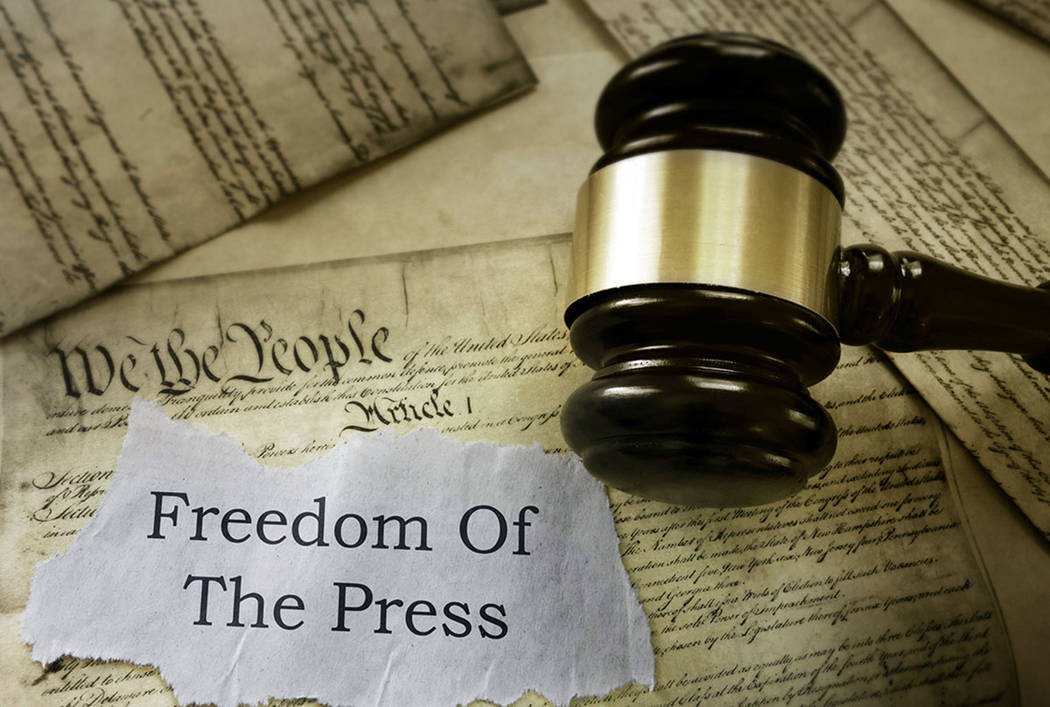Media experts question Nevada judge’s shield law ruling
A Nevada judge’s decision ordering a journalist to reveal confidential sources could discourage online reporters from pursuing news, media experts say.
But Storey County District Judge James Wilson’s ruling this week against Sam Toll, editor of the Northern Nevada website The Storey Teller, is unlikely to set a legal precedent in the state, according to Patrick File, a University of Nevada, Reno assistant professor of media law.
“It’s a reason for pause,” File said, pointing out that reporters and their sources could view themselves as being indirectly affected by the order. “You could see them thinking twice about their legal protections and their ability to report on controversial issues and develop sources.”
He added that Wilson’s decision also could embolden those who seek to silence online journalism.
Toll said he was stunned by the ruling but plans to continue working as a journalist.
Wilson’s order came in a defamation lawsuit filed by Lance Gilman, a commissioner in northwestern Nevada’s Storey County and owner of the Mustang Ranch Brothel.
Toll had reported that Gilman was not a resident of the county.
Wilson found that because Toll was “not a reporter for a newspaper or press association before August of 2017” his reporting was not protected by the state’s shield law, which prevents reporters from being forced to identify sources.
While the statute does not specifically contemplate web-based journalism, it reads that “no reporter, former reporter or editorial employee of any newspaper, periodical or press association or employee of any radio or television station” should be forced to disclose the source of published or unpublished work product. Wilson declined to rule on whether Toll was employed by a periodical, saying Toll had failed to raise the issue.
In his decision, the judge considered whether Toll’s articles appeared in print, which File said should not matter.
“The ruling is a narrow interpretation of the letter of the law,” File said. “It’s not really in keeping with the spirit of the shield law or shield laws in general, which are intended to protect the free flow of information to the public through the conduit of journalism.”
Toll’s attorney, Luke Busby, issued the following statement Friday:
“While we respect Judge Wilson, we fundamentally disagree that an online journalist should be compelled to reveal their sources because they publish news articles in an online newspaper instead of traditional print newspaper. Such a ruling undermines the protection of fundamental Constitutional principles of freedom of speech and of the press and stifles the free flow of information that is essential for any free society to exist.”
In the same order, the judge found that any information from Toll’s sources gathered during, on or after August 2017, when he joined the Nevada Press Association, should be protected.
But Richard Karpel, executive director of the Nevada Press Association, said Wilson’s ruling also failed to consider the spirit of the state’s shield law, which was created in 1969 and amended in 1975, and which Karpel called one of the strongest in the country.
Karpel said judges should focus on whether a person is practicing journalism, not where the journalism is being published.
“From the Nevada Press Association’s perspective, Sam Toll is a reporter, and he was practicing journalism, and he should be covered by the shield law,” Karpel said.
In 2016, a Clark County district judge granted shield law protection to a documentary filmmaker — the first time a Nevada judge had extended the press privilege beyond institutional reporters.
Glenn Cook, executive editor of the Las Vegas Review-Journal and president of the Nevada Press Association board of directors, said Wilson’s decision improperly defines the role of the association.
“The Nevada Press Association is not a licensing body. It goes without saying that membership is not required to work as a journalist in Nevada, and membership is not required to be covered by laws that protect a free press,” Cook said.
Contact David Ferrara at dferrara@reviewjournal.com or 702-380-1039. Follow @randompoker on Twitter.
Statement from Sam Toll
"By coming forward and disclosing wrongdoing within government or business, whistleblowers stand to lose their jobs, their families or worse. If whistleblowers can't rely on journalists to maintain their anonymity, we all lose as a society. The most valuable currency we have as journalists is our integrity. I made a promise to my sources and must consider the real prospect of jail time simply because I don't put into paper while reporting. This situation mixes two parts Kafka and one part Orwell for online journalists."























